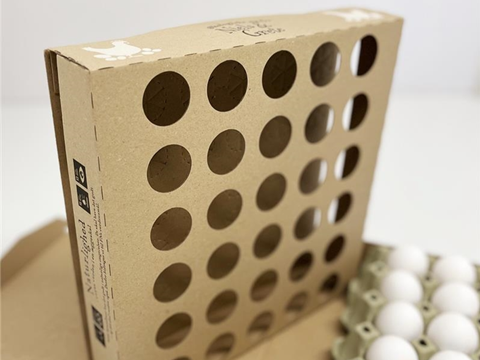
DS Smith is helping Niels & Grete replace its plastic packaging components with a corrugated cardboard pack, boosting recyclability while reducing unnecessary materials and streamlining the packaging process.
Originally, Niels & Grete utilized two moulded pulp trays, a large label, and plastic wrapping fixed with a heating technique to package thirty organic eggs.
The new design, developed in collaboration with DS Smith, involves one existing pulp tray being slotted into a corrugated cardboard pack. Perforations and holes have been integrated into the top and bottom of the pack, respectively, to accommodate different egg sizes.
DS Smith reports that the corrugated cardboard is 100% recyclable; the new packaging and packaging process is set to cut down on the volume of materials used while increasing the speed and efficiency of the packaging process.
The redesign is also expected to enhance stacking stability, with the eggs packed and locked into the tray from above and below using the perforated areas.
“We are delighted with this sustainable packaging solution,” said Niels Riis, CEO of Niels & Grete. “We are committed to providing our customers with a natural and fresh product and these sustainable trays can be packed in a clever and compact way while protecting our eggs during transit.
“The trays also make our product look fantastic as we can print our design and logo directly onto the cardboard. The sustainable and recyclable materials are in keeping with our brand ethos and we have received extremely positive feedback from our customers who are finding the trays easier to open and store.”
DS Smith’s design team also applied the company’s Circular Design Metrics tools when developing the pack. These use eight key indicators – including carbon footprint, reuse, supply chain optimization, recyclability, material utilization, and recycled content – to quantify the sustainability performance of a pack, through which brands and retailers can compare design solutions and find the best fit.
Adele Cunningham Mikkelsen, account manager at DS Smith, adds: “We wanted to replace the original plastic trays and instead introduce a corrugated cardboard and fully fibre-based packaging solution for Niels & Grete. Our design was intended to make the packing process faster and more efficient, and using our unique Circular Design Metrics tool, we wanted to reduce the materials used in the overall packaging solution.
“We are thrilled for the opportunity to collaborate with Niels & Grete on this innovation.”
Cascades launched its own complete packaging solution for the egg market last summer. Comprising a moulded pulp base and a sleeve made from coated recycled board, it claims to be 100% recycled fibres and, at the time, was pre-qualified by How2Recycle as widely recyclable.
At the same time, the company’s R&D centre claims that the new pack triples the rigidity and doubles the stacking strength of a 12-egg carton with a label, thus keeping the eggs safer.
In more recent news, DS Smith has partnered with bfresh spitiko creator V. Roubis to create a corrugated cardboard e-commerce solution for holding and protecting juice products in glass bottles during transit, intending to replace traditional wooden trays.
Akarton has also revealed that Hexpand, its protective cardboard packaging material for transporting fragile goods, is licensed for production and distribution in Europe. Designed for 100% recyclability, it aims to cut down on plastic packaging and padding material when packaging everyday products like food, as well as valuable products like electronics.
If you liked this story, you might also enjoy:
Reuse vs. single use – which is better for the environment?
Sustainable Innovation Report 2025: Current trends and future priorities
What can the world learn from South Korea’s world-leading performance in plastics circularity?














No comments yet